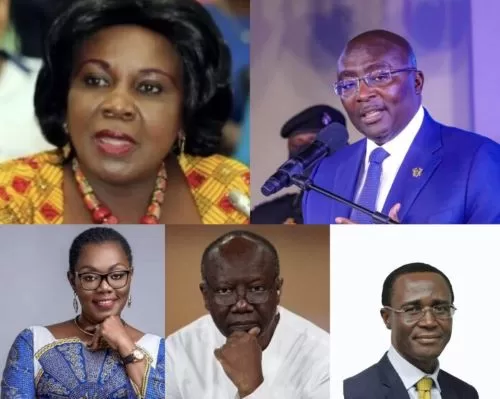So we all know that this government is embarking on a Digital Ghana Agenda, which is being touted as one of the best on the African continent. In fact we even enjoy accolades on the global level for it.
If you have noticed, about 90% of the Digital Ghana Agenda is FinTech (financial technology) driven. And the key mantra around the agenda is Financial Inclusion.
Financial Inclusion simply means bringing the greater majority of Ghanaians (mostly the poor and uneducated) who do small businesses but are outside of the mainstream financial sector into the space for two main reasons:
1. So they can also have access to financial services
2. SO GOVERNMENT CAN TRACK THEIR CASH FLOW FOR PURPOSES OF TAXATION AND PREVENTION OF FINANCIAL CRIME.
You would have expected that since government is the one championing this agenda, it’s appointees will be enjoined to avail themselves of digitalization to encourage the rest of us to do same.
This is why the single case of a Minister keeping such huge sums of over $1 million, more than €300,000 and million of cedis at home, rather than in the bank, only goes to show that this DIGITAL GHANA AGENDA may be another big scheme by this government just to track and tax the moneys of everybody else, including the poor, while government appointees get to hide millions in their bedrooms away from the tracking eyes of the tax collector.
The Charge Sheet
For the avoidance of doubt, take note that per the original and even the amended charge sheet on the case in court, all of the stolen $1 million, €300,000, the millions of cedis belonged to Cecilia Abena Dapaah, except the six set of suits worth $3,000, and kente cloth worth GHS90,000.
This government has been driving every Ghanaian to deposit their dollars in the banks to help boost the strength of the Cedi against the dollar. There is a law in this country that prevents even bank branches from holding as much as $1 million in their vault overnight. The money must move to headquarters once it gets to a certain threshold. It appears everyone else is being driven to fall in line with the government’s digital finance agenda except the members of the Nana Addo Dankwa Akufo-Addo government.
Definitely, there are very positive sides of digitalization. But let’s put the concept within the context of this matter.
1. It is because of digitalization that government is now able to slap e-levy on money transfers made by even very poor people in this country. Now GRA has visibility on every pesewa of everyone within the digital finance and banking space, thanks to Ghana Card. Meanwhile, ministers are keeping such huge moneys outside of the space.
2. It is because of digitalization that fraudsters are now able to steal up to GHS82 million in 2022 alone via mobile money fraud and digital banking fraud. And per the Bank of Ghana’s Banking Fraud Report, most of the victims were uneducated people. So the poor have been made vulnerable to the risks of digital finance while the rich are hiding moneys from the space.
Nigeria
In Nigeria, when the National ID was introduced, it became difficult for a lot of corrupt “rich” people to access funds they have stolen and hidden in banks under pseudo names. Now your fingerprint is linked to only one name and you cannot go and claim such huge money without proof of ID to show you are the owner.
I bet some big people in Ghana who were hiding big moneys under pseudo names rushed and cashed out their moneys and kept them at home before Ghana Card became the de facto ID for banking.
Obviously, at some point, Cecilia Dapaah’s house helps noticed that madam has been bringing or had people bringing huge sums of money in bags to the house, so they started helping themselves to some of it because they know the hardship this government is putting us through, and yet a member of the government had access to such huge unexplained funds at home. I bet anyone in the shoes of the house helps would have helped themselves to some of that money. I would!
Think about it – that so much money was stolen between July and October 2022, and they only realized it in October. How much money would one have to have at home for over a million dollars, hundreds of thousands of euros and millions of cedis to be stolen over four months before they realized it?. It only tells you the money there is so huge they did not even realize it was going. In fact they had to catch one of them red handed before they noticed what was going on. Had they not caught one with the duplicate key to the bedroom, I bet the theft would have still been going on till date.
So, when government appointees keep such huge moneys outside the government’s own digital financial space, presumably to hide it from the tax collector, and now the state is providing military protection for such people, what message are they giving to the rest of us? That we should also keep our moneys at home, avoid the probing eyes of the tax collector, evade taxes and beef up our security at home right?!
Instead of providing such Ministers and government appointees with military protection, I think we need to rather do a search of their houses and see what we can find. We might be shocked how much unexplained moneys they are hiding in their homes towards the 2024 elections.
Let’s remember that apart from being in the news for talking down on an ADOM Newsroom intern years ago, Cecilia Abena Dapaah, had never been in the news for anything untoward. So, if this kind of scandal can just emerge about someone like her with a laid-back posture, then one can only imagine how much money the main front liners and defenders of ills in government are keeping in their houses and all kinds of places outside of the banking sector.
GRA
Ghana Revenue Authority (GRA) should be interested in the tax component of the moneys hiding in and stolen from Cecilia Dapaah’s house. That should be of a greater concern to GRA than unleashing rogue and shady entities like Safaritech Ghana Limited on reputable corporate taxpayers in the name of tax assessment. We want the GRA to tell us if Cecilia Abena Dapaah has filed her tax returns – was her taxes assessed, and what was the result of that.
The Financial Crime Office of Ghana should also be interested in how one person gets to keep this huge sums in her house in a country where individuals are not allowed to cash out more than $10,000 in a year. There should be a paper trail of the movement of these moneys, otherwise there could be possible money laundering and the FCO should make it its business to probe further.
This is a scandal that flies in the face of Digital Ghana Agenda and it is very worrying indeed.


















